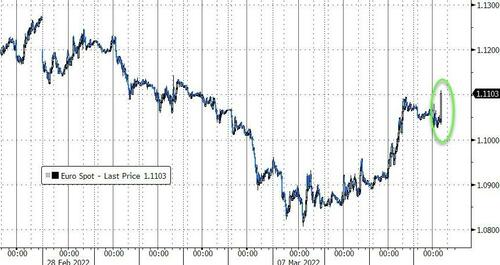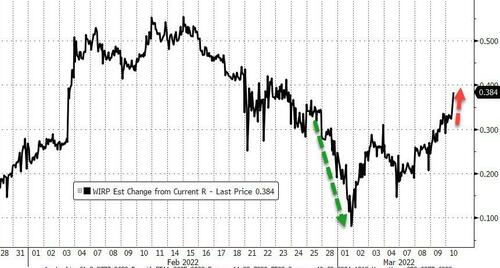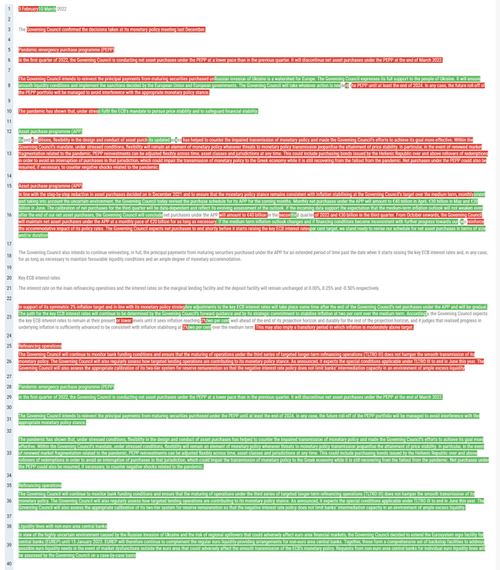Euro Jumps As ECB Accelerates Wind-Down Of Asset-Purchases
With expectations set low for any actual market-moving announcements, today’s ECB statement was expected to be more about buying time before big decisions than actual decisions, with the economic forecasts underpinning its decision-making likely to be subject to greater uncertainty than normal due to Russia sanctions fallout.
However, it appears The ECB was in more of a hurry than expected to normalize and did not use the escalating conflict as an excuse, rather it accelerated the end of its bond-buying program (APP)
Based on its updated assessment and taking into account the uncertain environment, the Governing Council today revised the purchase schedule for its APP for the coming months. Monthly net purchases under the APP will amount to €40 billion in April, €30 billion in May and €20 billion in June. The calibration of net purchases for the third quarter will be data-dependent and reflect its evolving assessment of the outlook
Additionally, the ECB says that it will take whatever action is needed to fulfil mandate.
This was a packed statement. Here are the main headlines:
-
ECB Announces Faster Winding Down of Asset Purchase Program
-
ECB: Will Take Whatever Action Is Needed to Fulfill Mandate
-
ECB Drops Wording That Rates Could Be Lower Than Currently
-
ECB Says It May End Asset Purchase Program in the Third Quarter
-
ECB Drops Pledge to End App ‘Shortly’ Before Rates Rise
The statement is overall on the hawkish side as it also drops wording that it could lower rates in the future.
As we detailed earlier, the conflict in Ukraine had dominated the hawkish shift signaled by Lagarde in February and following Powell’s lead to some extent (where he jawboned expectations for a March hike down from 50bps to 25bps), but after the biggest surge since April 2020 yesterday, the euro was leaking lower ahead of the ECB statement and then spiked higher on the surprise acceleration in ending APP…
And that also raised rate-hike expectations for the year…
The press conference will offer Lagarde more opportunity to show how ‘flexible’ the ECB will be – in other words, forget inflation, if the stuff hits the wall any harder from Russia sanctions fallout, the doves will descend faster than a Powell pivot.
Watch live (due to start at 0830ET):
ECB Redline below:
Read the full statement below:
Monetary policy decisions
The Russian invasion of Ukraine is a watershed for Europe. The Governing Council expresses its full support to the people of Ukraine. It will ensure smooth liquidity conditions and implement the sanctions decided by the European Union and European governments. The Governing Council will take whatever action is needed to fulfil the ECB’s mandate to pursue price stability and to safeguard financial stability.
Asset purchase programme (APP)
Based on its updated assessment and taking into account the uncertain environment, the Governing Council today revised the purchase schedule for its APP for the coming months. Monthly net purchases under the APP will amount to €40 billion in April, €30 billion in May and €20 billion in June. The calibration of net purchases for the third quarter will be data-dependent and reflect its evolving assessment of the outlook. If the incoming data support the expectation that the medium-term inflation outlook will not weaken even after the end of our net asset purchases, the Governing Council will conclude net purchases under the APP in the third quarter. If the medium term inflation outlook changes and if financing conditions become inconsistent with further progress towards our two per cent target, we stand ready to revise our schedule for net asset purchases in terms of size and/or duration.
The Governing Council also intends to continue reinvesting, in full, the principal payments from maturing securities purchased under the APP for an extended period of time past the date when it starts raising the key ECB interest rates and, in any case, for as long as necessary to maintain favourable liquidity conditions and an ample degree of monetary accommodation.
Key ECB interest rates
The interest rate on the main refinancing operations and the interest rates on the marginal lending facility and the deposit facility will remain unchanged at 0.00%, 0.25% and -0.50% respectively.
Any adjustments to the key ECB interest rates will take place some time after the end of the Governing Council’s net purchases under the APP and will be gradual. The path for the key ECB interest rates will continue to be determined by the Governing Council’s forward guidance and by its strategic commitment to stabilise inflation at two per cent over the medium term. Accordingly, the Governing Council expects the key ECB interest rates to remain at their present levels until it sees inflation reaching two per cent well ahead of the end of its projection horizon and durably for the rest of the projection horizon, and it judges that realised progress in underlying inflation is sufficiently advanced to be consistent with inflation stabilising at two per cent over the medium term.
Pandemic emergency purchase programme (PEPP)In the first quarter of 2022, the Governing Council is conducting net asset purchases under the PEPP at a lower pace than in the previous quarter. It will discontinue net asset purchases under the PEPP at the end of March 2022.
The Governing Council intends to reinvest the principal payments from maturing securities purchased under the PEPP until at least the end of 2024. In any case, the future roll-off of the PEPP portfolio will be managed to avoid interference with the appropriate monetary policy stance.
The pandemic has shown that, under stressed conditions, flexibility in the design and conduct of asset purchases has helped to counter the impaired transmission of monetary policy and made the Governing Council’s efforts to achieve its goal more effective. Within the Governing Council’s mandate, under stressed conditions, flexibility will remain an element of monetary policy whenever threats to monetary policy transmission jeopardise the attainment of price stability. In particular, in the event of renewed market fragmentation related to the pandemic, PEPP reinvestments can be adjusted flexibly across time, asset classes and jurisdictions at any time. This could include purchasing bonds issued by the Hellenic Republic over and above rollovers of redemptions in order to avoid an interruption of purchases in that jurisdiction, which could impair the transmission of monetary policy to the Greek economy while it is still recovering from the fallout from the pandemic. Net purchases under the PEPP could also be resumed, if necessary, to counter negative shocks related to the pandemic.
Refinancing operations
The Governing Council will continue to monitor bank funding conditions and ensure that the maturing of operations under the third series of targeted longer-term refinancing operations (TLTRO III) does not hamper the smooth transmission of its monetary policy. The Governing Council will also regularly assess how targeted lending operations are contributing to its monetary policy stance. As announced, it expects the special conditions applicable under TLTRO III to end in June this year. The Governing Council will also assess the appropriate calibration of its two-tier system for reserve remuneration so that the negative interest rate policy does not limit banks’ intermediation capacity in an environment of ample excess liquidity.
Liquidity lines with non-euro area central banks
In view of the highly uncertain environment caused by the Russian invasion of Ukraine and the risk of regional spillovers that could adversely affect euro area financial markets, the Governing Council decided to extend the Eurosystem repo facility for central banks (EUREP) until 15 January 2023. EUREP will therefore continue to complement the regular euro liquidity-providing arrangements for non-euro area central banks. Together, these form a comprehensive set of backstop facilities to address possible euro liquidity needs in the event of market dysfunctions outside the euro area that could adversely affect the smooth transmission of the ECB’s monetary policy. Requests from non-euro area central banks for individual euro liquidity lines will be assessed by the Governing Council on a case-by-case basis.
***
The Governing Council stands ready to adjust all of its instruments, as appropriate, to ensure that inflation stabilises at its 2% target over the medium term.
The President of the ECB will comment on the considerations underlying these decisions at a press conference starting at 14:30 CET today.
Tyler Durden
Thu, 03/10/2022 – 07:56
via ZeroHedge News https://ift.tt/sPC4Azm Tyler Durden


